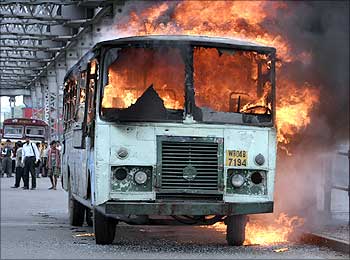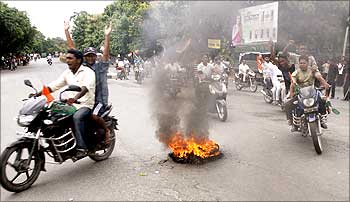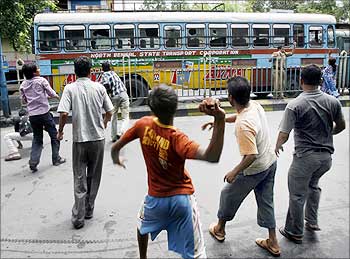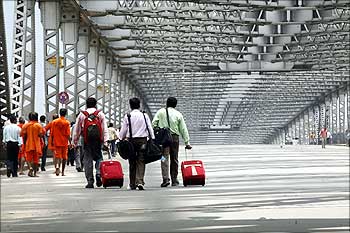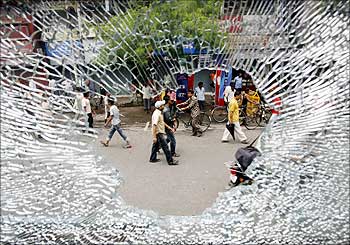 | « Back to article | Print this article |
Bengal bandhs = Rs 11,000 crore loss!
If you're a politician and you are in Bengal, calling a bandh has to be an integral part of your political strategy. For, it is by holding the state and its people to ransom that you can make your presence felt. Or so the politicians of this state presume, it appears.
A forceful state-wide bandh means disruption of rail and air traffic, closure of central establishments, poor collection of central exercise and customs duty and many more. These add up to a huge loss for the nation.
This bandh 'business' in Bengal is growing daily because it is the easiest way for the party to get free publicity without any capital investment.
A 12-hour Bharatiya Janata Party-sponsored bandh on November 30, was no exception to the rule.
Click NEXT to read on further. . .
Bengal bandhs = Rs 11,000 crore loss!
According to a recent Assocham report, frequent bandhs cause the state to lose 12.5 lakh (1.25 million) mandays in 2006, the year for which data about manday losses have been calculated by different state governments.
In the same period, Andhra Pradesh registered manday losses of 240,000, Rajasthan saw 130,000 mandays being lost, and Tamil Nadu lost 70,000 mandays.
In 2006, Tamil Nadu topped the strikes' list, having called 50 bandhs, followed by Bengal (29), Gujarat (23), Andhra Pradesh (18) and Haryana (14).
Bengal bandhs = Rs 11,000 crore loss!
As for wage loss because of bandhs, Bengal topped this list, registering a total loss of Rs 35.8 crore (Rs 358 million), followed by Andhra Pradesh with Rs 26.3 crore (Rs 263 million), Karnataka with Rs 13.2 crore (Rs 132 million) and Tamil Nadu with Rs 14.9 crore (Rs 149 million).
A parallel survey done by West Bengal Applied Economic Research for 2007 and 2008 had a similar story to tell. According to it, mandays lost through disruption in Bengal stood at over 30 lakh (3 million) in 2007 and 19.5 lakh (1.95 million) last year.
The figure assume more alarming proportions if one takes into account the fact that there have been more than a dozen bandhs in the past 39 months, excluding those in pockets like the hills and the forests.
Loss incurred by these bandhs would jack up the total loss incurred by West Bengal because of strikes to Rs 11,000 crore (Rs 110 billion) since August 2006.
Bengal bandhs = Rs 11,000 crore loss!
"Bandhs serve no purpose. They neither make a point nor solve a problem. All that they succeed in doing is throwing life out of gear and adding up to the loss in exchequer," says economist and Abhirup Sarkar.
"Bandhs come as a major jolt to the infamous work culture of the state and pull West Bengal down two rungs in the national ladder," he adds.
Assocham secretary general D S Rawat told a national daily that losses may climb steadily with general elections round the corner.
He apprehended political parties would now be up in arms to make their points and would call bandhs at the drop of a hat, leading to insurmountable losses and a steep fall in investment quotient of the state.
Bengal bandhs = Rs 11,000 crore loss!
A senior editor of the business section of a major English daily too endorses his views: "Bandhs are blots on the state's financial history. Unless bandhs are banned, Bengal will never be able to compete with other states economically. Bandhs break the financial backbone of a state."
Writer and activist Mahasweta Devi agrees with economist Abhirup Sarkar. "At a time when Bengal is striving to do up its image as far as industrialisation and development are concerned, bandhs only take it three steps backward. It's a sad state of affairs."
A regular blogger Arvind Kumar spewed frustration over the BJP-sponsored bandh on November 30 as he wrote, "Bandh supporters are causing trouble to the common man -- isnt it an irony? This bandh was called to support the common man. People are being forced to get off the roads disturbing daily commuters and office goers on their way to earn their 'bread n butter'!"
Whatever be the people's reaction, the political parties, it seems are not bothered about the bread and butter as long as they can earn some mileage. After all, politics is a heartless game.
